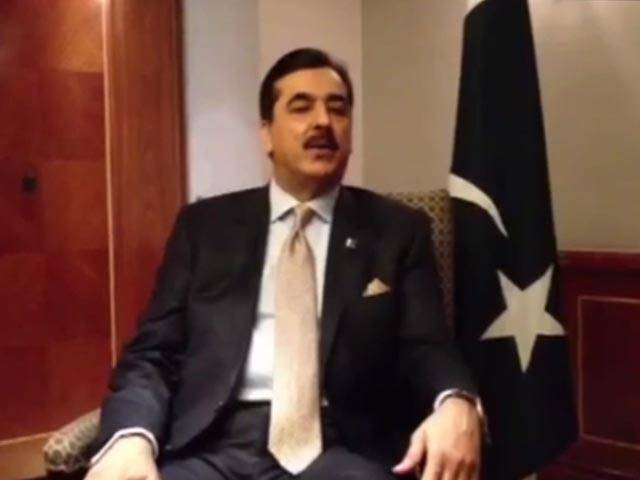Prime Minister Syed Yousuf Raza Gilani has insisted his country had not been "complicit" in sheltering Osama bin Laden and said the fact the late al-Qaida leader was able to live undetected for so long in Pakistan was down to a universal "intelligence failure".
Speaking after the one-year anniversary of Bin Laden's killing, Yousaf Raza Gilani rejected claims Pakistan had secretly known he was living in the garrison city of Abbottabad. US special forces killed Bin Laden on 5 May last year during a raid on his heavily fortified villa.
"There is no complicity. I think it's an intelligence failure from all over the world," Gilani said in an interview with the Guardian. He denied suggestions that elements within Pakistan's military may have been aware of Bin Laden's hideout. He added: "Why should we do that? We have suffered the most."
Gilani declined to say exactly what his intelligence services had gleaned from Bin Laden's wives and children, who left Pakistan for Saudi Arabia last month after a year in Pakistani custody. Nor would he comment on 17 documents seized at the Abbottabad compound and selectively released by Washington last week. "We have a judicial commission probing into that," he said.
On Monday Hillary Clinton said she believed Ayman al-Zawahiri, who inherited the al-Qaida leadership after Bin Laden's death, was hiding "somewhere in Pakistan". The US secretary of state said Washington was intent on "going after" al-Qaida's active leadership and said it was in Pakistan's interests to do the same.
On Wednesday, however, Gilani intimated that he didn't know whether al-Zawahiri was in Pakistan. "If there is any credible information please share it with us, so we can be quick and achieve our targets," he said. Asked if Mullah Omar, the Taliban leader, might also be in the country, the prime minister replied: "I don't know. Please tell us." The CIA was far more "powerful" than Pakistan's ISI intelligence service, and would have a better idea, he said.
Relations with the UK were "excellent", he observed. He argued that Pakistan was "part of the solution, not part of the problem" when it came to the "global issue" of fighting terrorism. "Osama bin Laden wasn't a Pakistani," he pointed out. The prime minister said the US had fuelled the problem by abandoning its ally Pakistan once the Soviets had been driven from Afghanistan. "The vacuum was filled by militants," he said.
Gilani also made clear his country had been the biggest loser from two decades of war and turmoil in neighbouring Afghanistan, and from the growing menace of Islamist extremism at home: "Pakistan has paid a huge price. Some 35,000 people have been martyred. 5,000 police and soldiers have been killed." In addition, Pakistan was now "catering for the needs" of 3.6 million Afghan refugees.
Gilani was upbeat about relations with Washington, which have been under severe strain since US-led Nato forces killed 24 Pakistani soldiers last November. The US has not formally apologised for the incident. Gilani admitted recent relations with the Obama administration hadn't been "too normal" but said the CIA and ISI were still working hard together to wipe out, or "achieve", as he put it, high-level targets. But he claimed it was practically impossible to police the mountainous Afghan-Pakistan border, where thousands crossed every day. "We don't know if they are tourists or militants," he said.
The prime minister refused to say whether the Taliban should play a role in a future national unity government in Kabul, or were integral to a political solution in Afghanistan. Instead, he said, Islamabad supported political reconciliation in Afghanistan so long as it was "Afghan-owned and Afghan-led." Of Pakistan's role, he said: "We are a facilitator."
He was surprisingly upbeat about relations with Delhi and spoke warmly of India's prime minister, Manmohan Singh. Islamabad was "serious" about resolving all core issues with India, including Kashmir and the heavily militarised Siachen glacier, where 139 Pakistani soldiers were tragically buried in an avalanche last month.
Gilani is the longest serving prime minister in Pakistan's history, having been in office since 2008. But his government has become increasingly unpopular, with Gilani given a token jail sentence last month by the country's supreme court. Gilani shrugged off his ongoing legal woes, which stem from his refusal to reopen a money laundering investigation into the country's president, Asif Ali Zardari.
The prime minister was amusingly scathing about Imran Khan, the cricketer turned politician, who will challenge Gilani's Pakistani People's party (PPP) in next year's elections, and has a growing following among young people. Asked whether Khan might eventually become Pakistan's prime minister, he replied: "If he [Khan] wins his own seat." He added: "He's a good cricketer. But he has no future in Pakistan."
Thursday, April 18, 2024
Gilani rejects claims Pakistan sheltered Osama bin Laden

ITP cracks down on traffic violations
April 18, 2024
Illegal housing societies in Rawalpindi to face crackdown
April 18, 2024
SZABIST traffic volunteers visit Safe City Islamabad
April 18, 2024
Hepatitis Challenge
April 18, 2024
IMF Predictions
April 18, 2024
Wheat War
April 18, 2024
Rail Revival
April 17, 2024
Addressing Climate Change
April 17, 2024
Justice denied
April 18, 2024
AI dilemmas unveiled
April 18, 2024
Tax tangle
April 18, 2024
Workforce inequality
April 17, 2024
New partnerships
April 17, 2024
ePaper - Nawaiwaqt
Advertisement
Nawaiwaqt Group | Copyright © 2024





